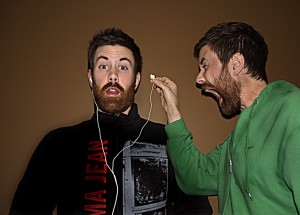Make Marketing Suck Less
Listen Up! The Most Powerful Communication Skill
By Michelle Mazur > August 4, 2013
Filed Under Public Speaking
 Are you a good listener? Me – I suck at it, but I'm in good company because most people suck at listening. If you don't, I'm in awe of you and please leave a comment at the end of the blog. If you aren't read on – here's a little story about a listening fail.
Are you a good listener? Me – I suck at it, but I'm in good company because most people suck at listening. If you don't, I'm in awe of you and please leave a comment at the end of the blog. If you aren't read on – here's a little story about a listening fail.
“You're are not listening to me,” I yelled at my boss.
I just spent 5 minutes explaining a problem we were having based on feedback that I received from my coworkers.
My boss interrupted me and said, “Michelle, you really shouldn't listen to the whining of your colleagues. A real leader…”
And that is when I yelled. I know, you shouldn't yell at your boss, but nothing says “I don't give a crap about what you have to say” like an interruption with an irrelevant object lesson in leadership.
Frankly, I didn't need the lesson because 1) I asked for this feedback; 2) I taught undergraduates for 10+ years so I know how to deal with whining, and 3) It had nothing to do with the problem at hand.
Whether your leading or speaking, it's time to get out of your head and get into listening. Here are 5 tips to help you shut up and listen!
Table of Contents
Show up for the conversation
Switch off the TV, computer, laptop, iPad, phone and any other electronic device and simply be present. Focus on what is being said. If your mind begins to wander, re-focus on what the other person is saying. If you're thinking about how to respond to what's being said, you're not listening. Tune in and focus on what is being said.
Don't ASSume
You (and me) often stop listening because you just KNOW what the other person is going to say. This is incredibly arrogant and let's face it – you don't actually know. When you tune out, your brain fills in the gaps for you. Unfortunately, your brain tends to be incredibly wrong most of the time. You know what they say about assumptions that make an ass out of you.
Don't interrupt
Hear the other person out. Interrupting the other person sends the relational message that you don't care what the other person has to say and ultimately that they aren't of value to you. It's tempting to jump right in, but let the other person finish their thought.
Eye contact is crucial
To be honest, I should have known my boss wasn't listening to me. He wasn't looking at me. When listening, maintain eye contact. It will keep you keyed in to the other person and help you pay attention. Eye contact is not just for speakers, it is for listeners too.
Paraphrase back
A sign that you are listening is when you are able to paraphrase back to the other person what they just said. Even if you disagree with what is said – it says to the other person that you heard them, understand and value their opinion.
Listening is an under appreciated skill when developing relationships. Listen loudly and boldly. Your relationships will only grow when you cultivate your listening mojo.
How do you rate your own listening skills? I'm listening and would love to hear your thoughts in the comment section (get hear your thoughts…I'm totally listening!)
Create Your One-of-a-Kind Message
Your 3 Word Rebellion is the Key to Growing Your Business & Impact






